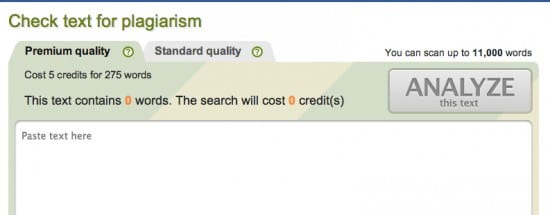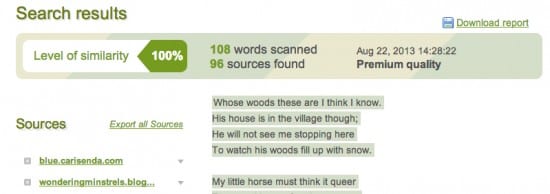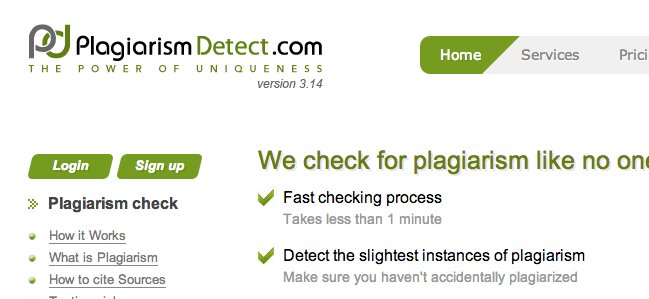PlagiarismDetect: Solid Detection at a High Price
 With more and more plagiarism detection services coming online, it’s admittedly getting harder and harder to keep track of them all. Though CopyScape is still the best-established and best-known among webmasters, there is also Plagium (Previous Coverage), PlagSpotter (Previous Coverage) and Plagiarism.Pro (Previous Coverage) to name a few. There are also academic-oriented plagiarism checkers, such as PlagScan (Previous Coverage) and several ill-fated projects, all trying to take market and mindshare away from Turnitin.
With more and more plagiarism detection services coming online, it’s admittedly getting harder and harder to keep track of them all. Though CopyScape is still the best-established and best-known among webmasters, there is also Plagium (Previous Coverage), PlagSpotter (Previous Coverage) and Plagiarism.Pro (Previous Coverage) to name a few. There are also academic-oriented plagiarism checkers, such as PlagScan (Previous Coverage) and several ill-fated projects, all trying to take market and mindshare away from Turnitin.
(Disclosure: I am a paid consultant for iThenticate, which is owned by Turnitin’s parent company, iParadigms.)
PlagiarismDetect.com is another online plagiarism checker that is trying to carve out a niche in the market. But with so many companies serving the major markets, PlagiarismDetect has an uphill battle trying to provide services that are compelling to users.
At the company’s request, I decided to give PlagiarismDetect a try and see how I felt about it. I was provided 200 free credits, $20 value, to test the service out and I used that to put PlagiarismDetect through a battery of tests, both to see how well it worked and how it stacked up against competitors.
The results were interesting but somewhat inconclusive. In the end, my experimentation with PlagiarismDetect painted the picture of a solid plagiarism checker with a somewhat unorthodox interface and an unfortunately high price point that may keep many people from using it.
About PlagiarismDetect
PlagiarismDetect is a plagiarism detection service that has been in operation since 2008. According to their about page, they are on version 3 of their service, which, according to them, is radically different from the earlier incarnations, having improved speed and accuracy.
The product is targeted primarily at students and teachers who want to check works for plagiarism but is also used by corporations, in particular publishers, webmasters and others to check for originality in documents.
Regarding the service itself, anyone who has used a plagiarism detection service should feel comfortable with PlagiarismDetect’s interface. After purchasing credits, which cost 10 cents each (minimum purchase of 50) users can then either paste in the text they want to check or upload a document (TXT, DOC, DOCX and ODT files only).

The amount of credits a search takes depends on both the type of search being performed and the length of the document. Standard searches cost 1 credit for 275 words and Premium searches cost 5 credits for 275 words. This means even the most basic search involving the shortest work costs 10 cents.
It’s also worth noting that the pricing is done purely based on tiers, rather than the pure word count. For example, 276 words will cost the same as 549 as they are both in the 275-550 tier.
The results of the search are displayed in a straightforward format. The text provided is displayed with the questionable passages highlighted and a list of suspected sources to the left. You can go through the document and determine which copied passages are plagiarism or just examples of copied material used correctly.

All in all, PlagiarismDetect is a fairly no-frills service. There is no ability to have it check a URL, while it has the ability to download a report, it doesn’t display anything not seen in the Web version of the report. (Sample Report Here)
For a service like this, how good it will come down to the matching and that is what I decided to put to the test.
Testing PlagiarismDetect
To test PlagiarismDetect, I followed the now-standard procedure of putting it through a battery of side-by-side tests with CopyScape. CopyScape was chosen because it has been well-tested (on this site and elsewhere) and it’s performance generally well-regarded.
I took a look at 10 different documents, they included:
- 2 Short Stories: Of which only a handful of copies should be online.
- 3 Poems: Shorter works that, historically, have had plagiarized a moderate amount by others.
- 3 Blog Posts: Three posts from within the last 24 hours from three different popular tech blogs. To test the immediacy of the different services.
- The Declaration of Independence: A stress test to see how many copies of a highly-copied document the services can find.
- Stopping By the Woods on a Snowy Evening: The popular Robert Frost poem, also a stress test.
(Note: As with previous tests, if either company wishes me to provide the URLs tested, I will do so. However, I keep these (mostly) hidden to prevent other plagiarism services from studying for the test.)
With the documents selected, I ran all ten through PlagiarismDetect Premium, PlagiarismDetect Standard and Copyscape. The results are below:
[table id=5 /]Interestingly, in the two short story tests, PlagairismDetect Standard did better than its Premium sibling (and CopyScape). However, for the other 8 cases, it was mostly a battle between CopyScape and PlagairismDetect Premium. In those cases, PlagiarismDetect Premium seems to come out ahead, taking 5 out of the 8.
All in all, PlagiarismDetect, between its two incarnations, took 7 of the 10 cases based on numbers alone.
However, there is a problem. Many of the matches PlagiarismDetect found were false, either non-working sites or documents containing less than 10 matching words. Strip away the clearly false matches and the numbers balance out fairly quickly, making the difference almost minimal.
From a usability standpoint, the false positive issue wasn’t too serious. PlagiarismDetect did a decent job ordering its results and, though it wasn’t perfect, the pages with the higher amount of matching content were usually toward the top.
All in all, it was a solid performance for PlagiarismDetect. The service more than held its own with its matching. It found results for every single test, including the original page (when there was one), each time.
But is solid matching going to be enough to make PlagiarismDetect your favorite checker? For most, that’s probably doubtful.
My Main Concern with PlagiarismDetect
Despite the quality matching done by PlagiarismDetect, I’m hard-pressed to give it a strong recommendation.
The biggest problem I have with PlagiarismDetect is the price. The checks on PlagiarismDetect simply cost more than they do at other services.
To illustrate this, I compared the prices of PlagairismDetect against CopyScape and PlagScan, likely the most expensive purely Web-based plagiarism checker I recommend to webmasters.
To simplify things, I looked at just two plagiarism checks, the first story one and the Robert Frost poem, the longest and shortest works respectively, and converted their costs from their respective credit systems to USD (based on the lowest amount of credits I could buy).
[table id=6 /]The price difference is pretty striking. PlagiarismDetect Premium, in the first story check, was more than 7 times the cost of PlagScan and 70 times the cost CopyScape. Even the standard search was more expensive, almost twice as much than PlagScan and 14 times as expensive as CopyScape.
Even on the shortest test PlagiarismDetect didn’t fare well, it’s premium product was 10 times more expensive than its competitors and its standard check was double the cost.
On the high end, PlagiarismDetect competes more directly with WriteCheck, a service provided by iParadigms, the makers of Turnitin and iThenticate (see above disclosure). While WriteCheck is (for most uses) more expensive at $8 for a single paper (with three resubmissions), it also provides additional features including additional databases, grammar/spelling help and the use of the same technology as most colleges and high schools.
This puts PlagiarismDetect in a strange place. It’s priced too high to be competitive among it’s Web-only peers and lacks the features to compete with the higher-end plagiarism checkers.
Regardless of whether you are most concerned about cost or thoroughness, there are better solutions available right now.
Bottom Line
What it all comes down to this this: PlagiarismDetect is a plagiarism checker geared toward determining the originality of an unknown or a suspect document. To that end, it works well. The interface is adequate, the matching is solid and everything moves at a good pace.
However, the price of PlagiarismDetect is going to put off many potential users, especially those with a large number of documents to check. It’s significantly more expensive than similar services and the results are comparable. Most who would be tempted to use PlagiarismDetect would be better served by either PlagScan, Copyscape or WriteCheck depending on their needs.
This could change pretty quickly. If PlagairismDetect dropped it’s prices, making its standard check comparable to CopyScape, it might be something that can be justified in certain circumstances, namely when trying to find whether a shorter work is original or not.
As it is now though, there are other tools that are more complete and other tools that are cheaper, putting PlagiarismDetect at a strange place in a very large market.
Want to Reuse or Republish this Content?
If you want to feature this article in your site, classroom or elsewhere, just let us know! We usually grant permission within 24 hours.
